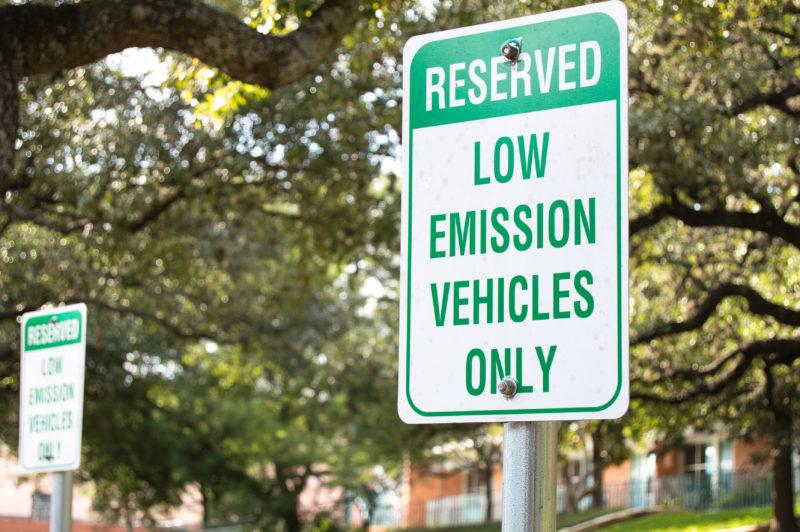The parking spots reserved for low-emitting and fuel-efficient vehicles in front of Murchison Hall have recently become a source of frustration for some Trinity students. Though the spots have been reserved since 2010, the rules concerning the spots are confusing to students living in the nearby dorms.
To park in the reserved spots, students must acquire a sticker for their car, attainable when they fill out the parking pass forms at the beginning of the semester. The sticker is free of charge, and available for vehicles that are qualified under the Leadership in Energy and Environmental Design (LEED) program, an international certification system that incentivizes green behaviors. Parking in the reserved spaces without the sticker will result in a ticket.
Sharon Curry, the university sustainability coordinator, elaborated on the history of the program at Trinity.
“The first spaces were added as part of the LEED certification of Miller Residence Hall, awarded in August 2010,” Curry said. “Subsequent spaces were added in conjunction with the LEED certifications of Calvert Residence Hall and Witt-Winn Residence Hall. The intent of the LEED credit we were seeking by adding the spaces is to reduce pollution and land development impacts from automobile use.”
Curry also spoke about the vehicles that qualify.
“Only vehicles on the list of LEED-qualified cars are given the stickers because they have met the criteria for the preferred parking. It is possible for a vehicle to be fuel-efficient, but not meet the criteria specified by LEED,” Curry said.
In order for Trinity residence halls to be considered LEED-certified, preferred parking for low-emitting and fuel-efficient vehicles must be provided for three percent of residents. The number of spots is a source of contention among Trinity students.
“There’s too many,” said Amanda Roche, a sophomore resident of Murchison Hall who drives a car that does not qualify for a sticker. “There’s already not a lot of parking, so it just limits the parking for everyone.”
Monica Lampton, sophomore and student assistant for Campus Planning and Sustainability, supports the program.
“I think the reserved parking spaces are a good idea because it is an incentive to live in a more sustainable way,” Lampton said. “Hopefully more students will want to live more sustainably and help the campus and the environment.”
When asked about the future of the program, Curry said her office is open to student input.
“There are also other strategies we might choose to pursue in addition to or in lieu of providing preferred parking for low-emitting and fuel-efficient vehicles. If students are interested in seeing additional preferred parking spaces, please let us know,” Curry said.
Students can reach Curry at [email protected].







